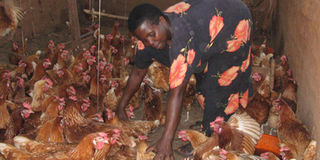Prime
Local poultry suppliers resort to cheaper chicken imports

A poultry farmer rearing birds. The local poultry sector is reeling from production losses due to the high cost of feeds incurred while breeding the birds. File photo
What you need to know:
Poultry sector. The Minister of Agriculture insists that Uganda produces enough for the market, meaning that there is no need for chicken imports.
Pastor Moses Solomon Male is mostly known for his pastoral work at Arising for Christ Church but besides that, the outspoken preacher has a lot of interest in poultry farming. For the last 20 years, he has been a poultry farmer, dealing in both broilers and layers.
But in recent times, the business has not been as exciting. Since the start of the year, he has hardly sold the volumes he sold some years ago.
“Many loss-making farmers, just like me, are downsizing their birds while others have quit poultry farming altogether because they are breeding birds that can hardly compete on the market.”
Pastor Male, who also doubles as the Secretary of Uganda Poultry Farmers Network (UPOFAN), represents a big section of Uganda’s poultry farmers who have lost the market to foreign imports.
Today, birds from Brazil, Belgium, South Africa, Denmark and Europe among other importing countries are increasingly visible on Uganda’s supermarket shelves. Reports show that local farmers are counting losses as dressed chicken dealers opt for what they describe as cheap and better quality imported chicken. The findings in a report to President Museveni indicate that about 45 per cent of dressed chicken sold on the Uganda market is imported. The report indicates that between 2011 to date, about 728,000 kilogrammes of dressed chicken were imported into Uganda.
Statistics from the Ministry of Agriculture indicate that Uganda produces more than 40,000 kilogrammes of poultry meat weekly. And with consumption of 30,000 kilogrammes, local poultry farmers are left no market as imported chicken floods the local market.
These imports have further found their way into other markets that would have otherwise been enjoyed by Ugandan poultry farmers, among them; South Sudan, Rwanda and Burundi. This move not only drew the attention of producers and dealers, but also the president. During his state of the nation address in June this year, he warned against importing poultry meat.
“I have been told, for instance, that somebody licensed the import of poultry meat. Yet, I have been promoting chicken production in the country. What is the interest of such an official?” President Museveni questioned.
But that warning hardly helped. To date, reports indicate that chicken imports are still saturating the local market. For long, local poultry breeders have enjoyed the monopoly in the industry with a ready market for the broilers and layers.
The market for the locally produced chicken grew bigger in the year 2005/2006 when imports of all meat products were banned. This was meant to guard against the risk of the outbreak of Highly Pathogenic Avian Influenza (HPAI) that occurred in many countries in Asia, Europe and Africa since 2003. But it did not take long for foreign producers took over the market.
Industrial players, allegedly attribute the twist in market trends to the poor quality of birds bred by the local farmers against the imports that are fairly cheap. Pastor Male says the poor quality birds arise out of the poor quality feeds that the birds are fed on.
“Feed millers deliberately manufacture poor quality, adulterated, degraded feeds and with high moisture content on which they never indicate nutritional contents and expiry dates because no one holds them accountable,” he said.
He says that feeds raw material dealers allegedly contaminate their stocks with sand, soil, stones and water (in fish, shells, cotton and sunflower) while in maize bran, they add sawdust, sand, white mica and other materials. “It is no secret that an 80 Kilogramme bag of mukene must have at least 30 Kilogrammes of contaminated materials.”
Apparently, if poultry and animals are fed on such feeds, they suffer stunted growth and keep consuming more feed than they should have even when they mature. This makes it difficult to get sizeable birds on the market as opposed to small, light bird-like broilers on the market that fetches a good price for farmers above their costs of production.
Poultry keeping in Uganda is proving to be a costly venture. Local farmers insist that besides feeds, labour, water and space fees are equally expensive which incidentally affects the overall market price.
At the end of the value chain, this pushes the price of each kilogramme of dressed chicken between Shs8,500 and Shs9,000, which is Shs1,500 more than the imported chicken.
However, other farmers argue that the locally bred birds are equally healthy and of good quality but have been overtaken by imported birds.
According to Ugandan Poultry Farmers Association chairperson, Mr Godfrey Okoth-Ochola, cheap imports have been increasing in the past months; “The imports are cheap; they are almost Shs1,500 lower than those produced locally and they are saturating the market.”
Origin of imports
Brazil’s chicken is among the most popular of the chicken imports on Uganda’s market. The low pricing is partly attributed to the country’s government policies, which support poultry farming especially through the use of mechanised systems of farming that are used to breed the birds.
For this, Brazil is a leader in meat and poultry exports and has some of the lowest production costs in the world, making their products cheaper. This year, Brazilian poultry production has been forecasted to rise by three per cent compared to last year.
In 2010, Brazil’s broiler production hit a record high of 12.9 million metric tonnes, according to the latest Global Alliance for Improved Nutrition (GAIN) report. This was attributed to increased local consumption and broiler exports.
Last year still, Brazil’s broiler consumption by both the local and external market grew by 3 per cent. This was attributed to the fact that chicken meat was the most affordable in the country compared to pork and beef. And for them, these were low sales given that consumption had been forecasted to grow to five per cent in the same year.
Chicken for export in Brazil is sold in 22 or 24 tonnes. According to the online prices, a kilogramme of poultry meat before payment of transport and taxes (FOB) costs $2.10 (Shs5,200), a price way lower than locally bred chicken in Uganda.
And as Brazil works smarter with its mechanised equipment to improve production, Ugandans are yet to follow suit. In effect, this makes labour very expensive; hence high market prices which hurt farmers’ returns.
On the African scene, South Africa seems to be flying. The country’s chicken has competitive advantage over locally produced chicken in other African countries. In South Africa- one of the other major exporters of dressed chicken- chicken meat and eggs are the most consumed products per capita compared to other animal protein sources combined.
Here, the poultry industry is not just an important component of the food value chain, it is an essential one. It is notsurprising that the South African food security and the poultry industry are closely intertwined.
As a result of the cheap imports, the country is losing billions in unpaid taxes. Information from the Uganda Revenue Authority seen by the Prosper team showed that major suppliers of dressed chicken on the local market import them.
Although some companies advertise that their poultry products are 100 per cent Ugandan-bred; the reality is that imports are re-packaged in Uganda, which means the country loses revenue.
URA confirmed that the main importers of frozen chicken were Fresh Cuts and Your Choice Limited while American Embassy imports in small quantities for domestic consumption.
The companies that facilitate poultry imports according to a URA document include: SDV Transami Limited, Interfreight (U) Limited, Shift Cargo Services, Ataco Freight Services Limited, Sausage Master Limited and Olympus Trading Company Limited.
The tax body, according to the spokesperson Sarah Banage said they collected at least Shs215million in taxes from the imported poultry last year, which industry experts claimed was less than what they were expected to pay.
These claims point to a likelihood of tax evasion by the chicken importers.
According to URA documents, Fresh Cuts (U) Limited also imported frozen chicken from Belgium, South Africa and Denmark.
Another consignment of 24 tonnes was imported by the same company, but declared as chicken on transit to South Sudan and it was valued at Shs100 million. The duties for this transit shipment would have been Shs31 million, if taxes were paid in Uganda.
Government intervention
With all this happening, government does not seem to be sleeping. Ministry of Trade insists that shipment of cheap imports at the cost of local production is illegal. The Animal Diseases Act imposes a fine of Sh2m or imprisonment of two years or both for illegal imports. Only hatching eggs and day-old chicks are permitted to increase poultry production in the country.
According to the commissioner of external trade in the ministry, Mr Silver Ojakol, Uganda has put in place countervailing measures to protect local producers against cheap imports. “We have measures to protect local producers and if it is established that the allegations are true, then the ministry will take action.”
And Minister of Agriculture insists that Uganda produces enough for the market hence no need for such imports. “We produce about 40,000 birds every week, just enough to feed the market. We can sustain our market without imported birds” Minister Tress Bucyanayandi said.
But Uganda needs to emulate other countries. Kenya, Ghana, Nigeria and South Africa have strict rules on importation of poultry products to protect the local farmers. And in February, the South African government adopted anti-dumping measures which affected imports of whole chickens and boneless chicken cuts from Brazil.




